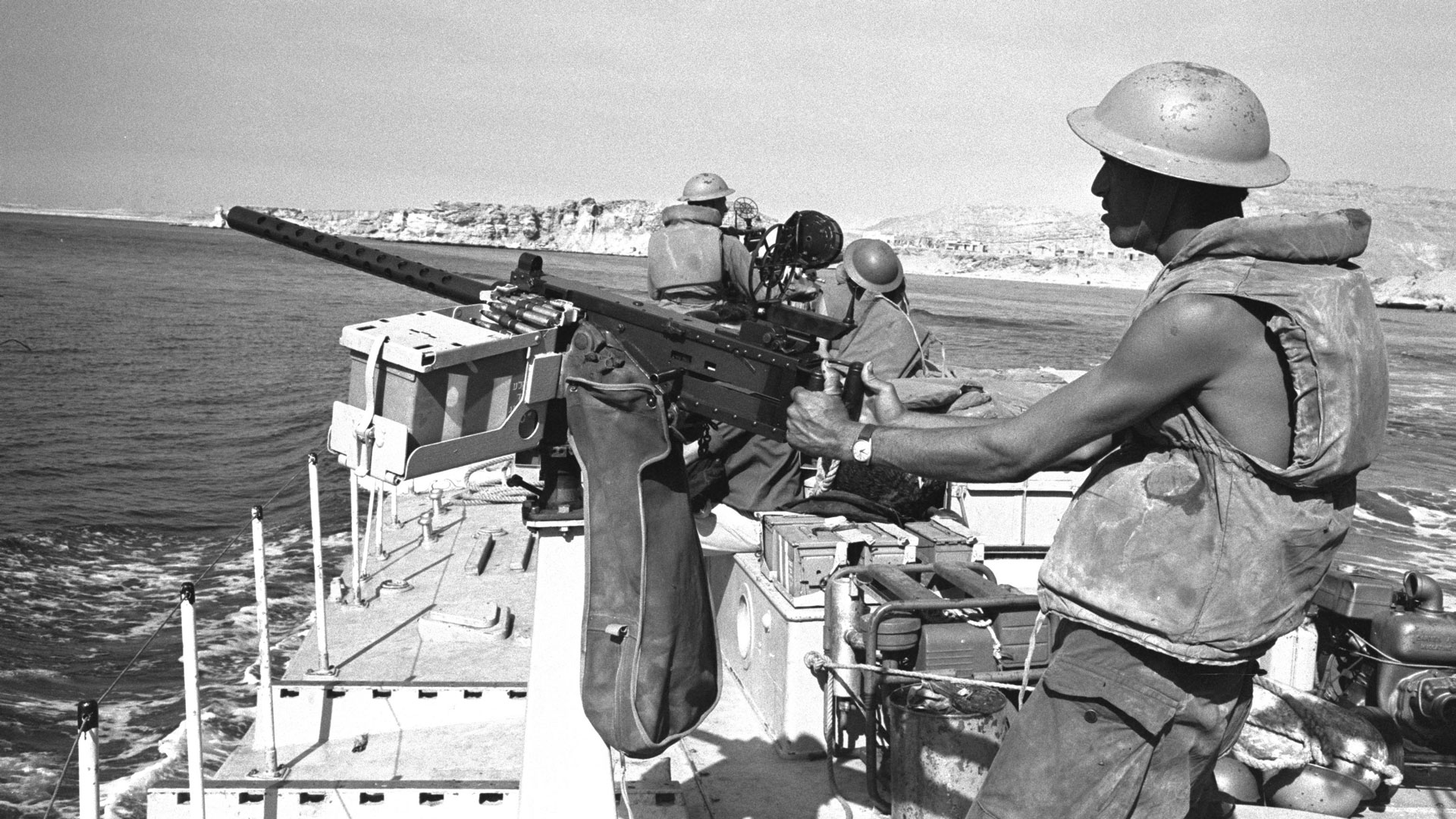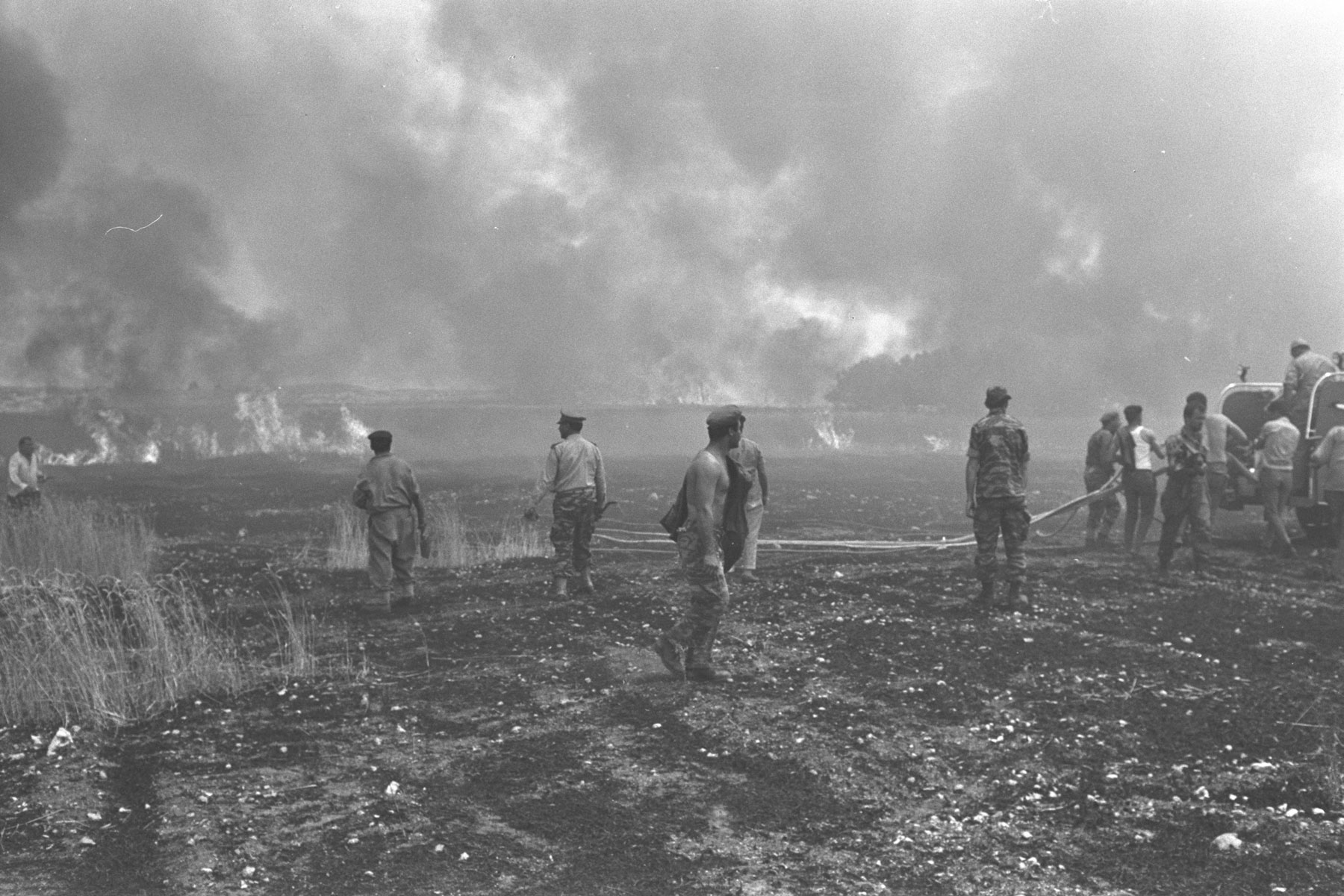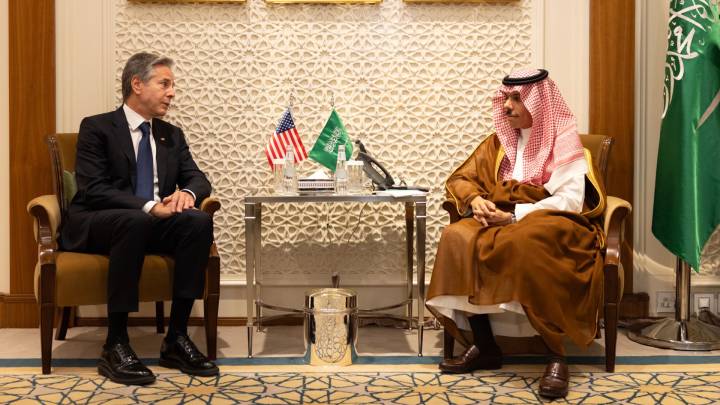Despite Israeli commemorations of the 50th anniversary of the Six-Day War, what was a strategic victory from a military standpoint created many of the political problems that contemporary Israel still grapples with, argues historian Helmut Mejcher.
zenith: 50 years ago, on June 5, 1967, the Six-Day War broke out. It ranged Israel against Egypt, Jordan and Syria. On announcing the ceremonies to celebrate the 50th anniversary, Israeli Prime Minister Benjamin Netanyahu referred to the Six-Day War as “one of the greatest victories in the history of Israel”. Do you agree?
Helmut Mejcher: Not at all. First and foremost, the Six-Day War created a lot of political problems for Israel. Their army removed the Egyptian blockade of the Straits of Tiran and so the Port of Eilat. But with the re-occupation of the Sinai they’d gone too far. On top of that, by occupying the West Bank, they re-gained control over a huge part of the Palestinian people – and this after they got rid of them in 1948. Finally, with the occupation of the Syrian Golan Heights, Israel could not resolve any of its problems with the delicate water infrastructure in the region.
Netanyahu continues talking about the ‘liberation’ of Judea, Samaria and the Golan Heights. In his opinion, the war brought back to Israel a part of its homeland.
By using those words, he is addressing the settler movement and those supporting it in the Knesset. This includes his coalition partners.
The concept of a blitzkrieg involving air and tank forces played a key role in Israel’s military strategy
A settler movement that began immediately after the Six-Day War?
That’s not exactly true. During World War II there had been intentions from the Zionist and even from the Jordanian side to settle Jewish farmers on the east side of the Jordan River. This was because the Jordanians already had some good experiences with settling Circassians from the Caucasus in the same region.
So the settler movement after 1967 was about farming?
No. Of course not. The goal of the settler movement after the Six-Day War was mainly to secure borders and corridors. On top of that it was in Israel’s interest to widen its narrow territory by occupying the West Bank. The strategy of the settler movement after 1967 was defined by applying the Allon Plan and variations of it.
And what about the settler movement today?
The large-scale Zionist settlements in the Palestinian West Bank as we know them today are basically an ethno-religious project of several Likud governments. It was Ariel Sharon who first called out for them to settle on as many hills as possible. Today, with fanatic groups like the national-religious ‘hilltop youth’, and with politicians beating the same drum, such as Naftali Bennett, leader of the Jewish Home party, there is no answer to the settlement question. Not even to mention a solution for it.
Let’s talk about what happened 50 years ago. Can you describe the situation before the outbreak of the Six-Day War?
In the ’60s, the reputation of the Egyptian president Gamal Abdel Nasser was thoroughly ruined. This was due to his military intervention in the civil war in Yemen and a joint campaign against him, initiated by Saudi Arabia and Jordan. Nasser found himself humiliated and mortified. He was urgently in need of a political victory to re-establish his standing and his leadership in the Arab world. The Sinai Peninsula seemed to be suitable for this plan – as it had already been targeted during the Suez Crisis in 1956.
That’s where Nasser expelled the UN-forces and replaced them with his own troops. Shortly after, Israel occupied the totality of the Sinai Peninsula. How was this possible?
The concept of a blitzkrieg involving air and tank forces played a key role in Israel’s military strategy. The Pentagon was well aware of this: When Israeli negotiators aimed to buy new weapons right before the outbreak of the Six-Day War, their demand was rejected. With the weapons, already in the hands of the Israeli army, the country was expected to win a war within one week only – even in case of an Arab attack. In the end it took two days for the Egyptian forces, who were armed by the Soviets, to be worn out.
Given the ongoing threats of the Egyptian president Nasser, Did this blitzkrieg really strike the Arab nations out of the blue?
The loud rhetoric of the Egyptian president was more of a proof of his helplessness than anything else. Turning to the US President Lyndon Johnson, Nasser once mentioned that he needs the masses to demonstrate his strength, whereas a serious force to be reckoned with hides behind every single word of the American president. For the Egyptian air force, the sly devastating blow of the Israelis came indeed out of the blue. This is also because the Egyptian vice-president Zakaria Mohieddin was supposed to visit Washington on the June 7, 1967 to mediate a de-escalation in the Sinai region.
It can be assumed that the growing American interest in oil from Saudi Arabia was to the benefit of Israel
Aside from having a common enemy: How did the Arab states get along with each other back at that time?
The Arab league was completely torn. That’s why during the Six-Day War Egypt received more offers of help from the Maghreb than from the Arab east. Already, the Egypt-Syrian coalition had not been very long lasting. The royalists from the Arab Peninsula were in opposition to the republicans and socialist Pan-Arabs. In Syria, there was an ongoing Arab “Cold War”, where supporters of the Neo-Baath party faced the Alawite military.
And what role did the great powers – Russia and the USA – play?
Given the threat of a looming war, the great powers both pursued a politics of containment, although they stood against each other in the Vietnam War. The US preferred Nasser to get his wings clipped – that’s why they gave the green light for Israel's strike. In return, Israel expected the US to promise not to ask for Israel’s withdrawal from the conquered territories after the end of the war – as opposed to the Sinai War in 1956.
And what did the Soviet Union do?
Before the outbreak of the Six-Day War, the Soviets spread a rumor about Israel concentrating its troops at the Syrian border. Today we know that this was a hoax. There obviously was an interest to transfer the war’s focus from the Sinai region to the north of the Middle East. As far as the motives of the different camps involved are concerned, there is still a lot of speculation going on.
What are those speculations about?
There is a debate if Moscow did see a more natural ally in the Marxist-Syrian Neo-Ba’ath Party than in the Egyptian president, who was obviously in favor of the Non-Aligned Movement. Also, to this date, it is not clear how much the existence of the nuclear reactor in Dimona in southern Israel influenced the events.
… the Russians were sure, that nuclear weapons were being produced in this location?
It’s only safe to say that Shimon Peres, director general of the Defence Ministry, did consider nuclear deterrence to be an appropriate mean in a worst-case scenario. It was Yitzhak Rabin, chief of staff, who clearly refused this.
Aside from the great powers: What role did Germany play back in those days?
The Federal Republic of Germany was basically involved as a supplier of arms. West Germany played a leading role in setting up the Israeli tank force. Out of its extensive stock of arms, it provided speedboats, howitzers, helicopters and anti-aircraft guns – and especially the M48 Patton, the much sought-after American battle tank. Those were available in large numbers and they were superior to the Soviet tanks that were used by the Egyptian army.
In your opinion: Was the Six-Day War a defensive war or a war of aggression?
First and foremost, it was an Israeli pre-emptive war, that Nasser provoked with a surprising carelessness. It was only after the cease-fire with Jordan and Egypt – when Israel conquered the Golan Heights – that it turned into a war of aggression. That attack was ordered by Defense Minister Moshe Dayan after the Israeli secret service intercepted a message of the Egyptian president Nasser. In this message, Nasser admitted his defeat and asked the Syrian president Nureddin al-Atassi to do the same, to save his own army. By the way, Dayan did consider his order to be a wrong decision later in time.
With the conquest of the Gaza Strip, the Sinai Peninsula, the West Bank, East Jerusalem and the Golan Heights, the cards in the Middle East were reshuffled. What were the consequences regarding the greater Arab-Israeli conflict?
With the total blockade of Gaza, the Mediterranean enclave became the centre of the Palestinian resistance under the influence of Islamist forces, later resulting in the formation of Hamas, in 1987.At the same time, the option of having an Arab or Jordanian corridor to the Mediterranean Sea was taken away. The Sinai was a good bargaining chip in the hands of Israel for later peace negotiations with Egypt. With the annexation of East Jerusalem and the Golan Heights, as well as the systematic settlement of the West Bank there is no doubt that Israel is not going to make do without those conquered regions. That’s why this conflict became a kind of Gordian Knot.
How did Israel take stock of this war?
Already before the Six-Day War, Israel suffered from a depressed prevailing mood. Because of a deep economic crisis more and more Ashkenazi Jews left the country for the Americas or South Africa. The few immigrants at that time were for the most part of Sephardi origins. After the war, due to the Arabs living in the West Bank, Israeli demographics were further challenged. Unlike during the years 1947 and 1948 – when about 700,000 Palestinians were displaced – there were no such flows of refugees. For this reason, there was a big uncertainty of how to deal with the growing number of Palestinian people.
This means, that from the Israeli perspective, there were only disadvantages?
The expansion of the narrow Israeli territory was essential for security reasons. Therefore, if at all, drawing a positive balance is only possible from a military strategic point of view. Besides, the conquest of the East Jerusalem allowed access to the Western Wall – this did boost the morale of the Jewish population.
How did the Six-Day War change the status of Israel in the world?
After Israel had won the war, the UN expected a quick beginning of peace talks to resolve the Middle East conflict. They asked Israel to withdraw from the occupied territories and – in return – they called on the Arab states to recognise the Jewish state. Israel however made it a condition to negotiate a peace agreement with each and every neighbouring country separately, before pulling back from the respective ceasefire lines. This was rejected by many states, including the USSR. Likewise, the Arab states refused any negotiations with Israel. This was answered with even more extensive control over the occupied territories.
What were the consequences of the Six-Day War for the Arab countries involved?
Jordan lost the Palestinian West Bank, which it had taken in 1950 against the will of the Arab League. This resulted in a great economic loss. Egypt had the highest number of casualties and with the Suez Canal, it lost its most important income source. Only Syria got off lightly – aside from losing the Golan Heights.
And the Palestinian movement?
Nasser had already backed the foundation of the PLO in 1964. But only one month after the end of the Six-Day War Yasser Arafat began to organize guerilla attacks against Israeli soldiers in the West Bank. Before the end of the year he moved his headquarters to the east side of the Jordan River. Three years passed before he was exiled to Lebanon.
In what way did the outcome of the Six-Day War influence the relations between the great powers – the Soviet Union and the USA – and the Arab countries?
The American diplomacy of mediation was heavily challenged. The forecast of US security adviser Walt Rostow did not come true: He had predicted that after getting Nasser’s wings clipped there would be a more moderate politic under a new leader. The idea of Arab nationalism had been smashed – the once cheering masses felt paralysed. Washington had already realised the upliftingpower of Islamic foreign policies, like the one followed by the new Saudi monarch, King Faisal. It was in their interest to curb those policies – not only in the context of the Yemen Civil War. However, because of this, they lost sight of the power turbulences in Syria, Iraq and Jordan. It remains unclear, if the US wanted to leave Ba’athism to the Soviets – in the same way as the sphere of interest had once been divided between the British and the French. Oil from Saudi Arabia was not yet relevant for the Americans at that time.
This changed drastically later.
Yes indeed. And it can be assumed that the growing American interest in oil from Saudi Arabia was to the benefit of Israel. It was only because of this interest that Washington felt obliged to formulate an American policy for the Middle East during the mid 20th century. And this policy was heavily influenced by Israel to push through its interests. This is not a conspiracy theory, but this political strategy is well documented in the archives of the Zionist Organization of America.
Isn’t Israel also strategically important for the West?
Of course. In particular during the Cold War, Israel’s military strength was of great importance for the West. It was useful to close NATO’s gap in the south east Mediterranean. In return, also Israel took advantage of that. For Israel and the whole Middle East, the West turning away from the region for energy policy or ideological reasons may have disastrous consequences. Those can only be avoided if the conflicting parties could close ranks – even if this means to embrace Russia.
Helmut Mejcher, born in 1937, is a preeminent Germany historian and an expert on the Middle East. From 1977, until his retirement in 2002, he worked as a Professor for Modern History with special reference to the Middle East and the Mediterranean at the University of Hamburg. His newest book Der Nahe Osten im Zweiten Weltkrieg (The Middle East during World War II) has been published by publishing house Ferdinand Schöningh (in German only).







